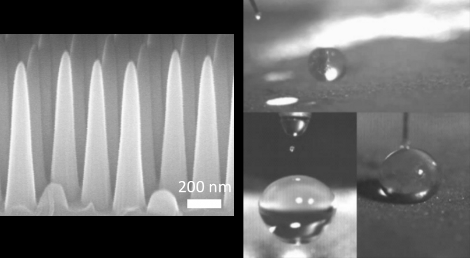
Some of the deep thinkers over at MIT have come up with an interesting hack for ordinary glass. If you coat it in a special way it becomes nearly invisible. This is only one of the effects of the coating, but brings images of people walking through glass walls to our minds.
Joking aside, this is really very useful. The images above show a microscopic view of the cones that are applied during the coating process. They prevent the surface tension on a drop of water from being broken, and you can see the clip of water actually bouncing right off the glass in the video after the break. This also means it acts as a non-stick coating for dirt, grime, and even fog. Anyone who’s taken a tropical vacation will know that taking a picture outside with a camera that’s been in an air-conditioned room results only in a snapshot of a foggy lens. This coating could change that. But it’s also got a lot of potential with the glass panes covering solar cells. If they can’t get dirty, and there’s virtually no glare, you should see a performance boost. It’ll be interesting to see how long this takes to come to market and what the first products to use it might be.
[via Reddit]















No photos? That’s a bit disappointing.
[/sarcasm]
Does remind me a lot of the moth-eye filter from Philips, here used to lower reflections on the panel.
http://translate.google.be/translate?sl=nl&tl=en&js=n&prev=_t&hl=nl&ie=UTF-8&layout=2&eotf=1&u=http%3A%2F%2Ftweakers.net%2Freviews%2F2385%2F3%2Fphilips-46pfl9706-zwart-als-de-nacht-minder-reflecties.html&act=url
The basic approach is known as a motheye surface. Subwavelengh rod structures operate in much the same fashion as anechoic tiles. The ultimate antireflection coating, perfect for solar cells and optics.
I was doing that 15 years ago with interference based photolithography. The problem isn’t fabrication it’s durability and cleaning. Water isn’t as much a problem as dust and handling. If the surface is durable enough to wash with a cloth and dust repellent we are looking at a major development. Otherwise it is just reinventing the wheel.
What advantages would this have over NeverWet?
Superhydrophobic coatings could possibly modify the transmissitivity in valuable wavelengths. It’s also possible that they’re easier to remove either mechanically or with a solvent.
No glare?
Give me a piece of glass like that in my laptop and I would love you forever!
I hate the Glossy screens these days!!!
Well, then never buy one! I have all my screens with matt finish.
Thats pretty much excludes anything from Samsung for me for example.
When nobody will buy one then they should disappear.
If it are cones won’t microscopic airpollution/dust/oily substances fill the spaces up after a month or so? And I don’t think mere water can absorb all that.
sounds like something to use for lenses of cameras being sent up in weather balloons…
I’ed kill for this on my car windshield in the winter!
This is good for solar cells right?
It used to be they coated the surfaces of laptop and TV screens with a matte type finish that made the surfaces almost invisible so you can see the displays with room back lighting and even in the sunlight.
Now all the laptop and TV screens have a polished mirror finish, so the displays are almost impossible to see without the glare and reflection of ambient lighting! Forget using these displays in the sunlight.
What’s up wit that nonsense?
This happens when stupid rule the world.
The same is with 16/9 screens – the most stupid and unusable aspect ratio except for widescreen TV programming.
Apple got it almost right with the iPad but till it has reflective screen, till no buy from me.
but but but….. shiny!
The shiny thing makes the blacks seem deeper, and people like shiny, and it’s easy to clean.
But yeah it’s not ergonomic in terms of devices you use to read stuff on or that need to be seen in daylight.
I would love this on my windshield.
Windshield that acts like it has permanent rainx anyone?
This has been “invented” probably half a dozen times already. Make it 1) durable and 2) inexpensive and we might have something worthwhile. Until then, this has already been done.
The professor leading this gave a presentation at my company and shared a video of the water droplets freezing the moment after they bounced off the surface. It was very impressive, but as others said she did not commit to being able to make it durable in the consumer sense and wanted help for mass production. I believe this was grown by creating a matrix structure on the glass and then repeatedly dipping it in solution until the cones grew to the desired height. She also demonstrated some crazy gecko skin and glass with flexible cones that reacted to light intensity.
Well when they start making glass doors out of this stuff they had better come with a warranty. Because I for already have a hard enough time seeing glass doors before I walk into them.
Can’t wait to see them apply this to lenses. It won’t prevent my camera lens from getting scratched, but it would definitely make for better video with less work. Not to mention, it would save time if I don’t have to clean the lenses.
Wonder about durability of such a texture…
Is it the build up of pressure in between each cone that repels the drop as it attempts to attach?